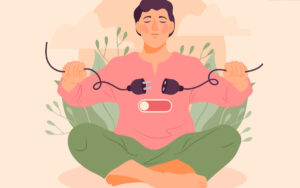Why Are Young Professionals Feeling More Stressed Than Ever?
Young professionals are navigating a uniquely challenging landscape. They’re entering an increasingly competitive job market, burdened by student debt, facing high living costs, and constantly connected to work through technology. Many young people feel a pressure to excel, driven by societal expectations, personal ambition, and the relentless comparison fostered by social media.
In this article, we’ll explore the root causes of stress in young professionals and offer practical solutions to improve mental health and well-being.
Key Points:
- Technology’s Role in Heightening Stress: The 24/7 work culture enabled by technology blurs the lines between work and life.
- Social Media and the Comparison Trap: Platforms like Instagram and LinkedIn perpetuate unrealistic comparisons, adding to anxiety.
- Parental Protection and the Shock of Independence: Overprotected young adults often struggle to manage the independence demanded in the professional world.
- Economic Pressure and Financial Anxiety: Rising costs, student debt, and financial uncertainty are contributing to overwhelming stress.
1. Technology and the 24/7 Work Culture: A Never-Ending Workday
The Problem: As a young professional, you may find yourself feeling like you’re never truly off the clock. The modern work environment, coupled with the constant connectivity of technology, makes it difficult to draw clear boundaries between personal time and professional obligations.
You’re likely familiar with the anxiety of seeing notifications ping late into the evening, or the pressure to respond to emails outside of work hours to prove dedication. Social media and professional platforms like LinkedIn reinforce the need to stay “always-on,” comparing your hustle to others’. This hyper-connectivity may even lead to waking up in the middle of the night to check work messages, driven by an underlying fear of falling behind or being perceived as unproductive.
This kind of lifestyle leaves little room for true relaxation. It’s easy to feel overwhelmed, as your mind is constantly toggling between tasks, unable to fully recharge. The risk? Burnout, anxiety, and the feeling that no matter how hard you work, it’s never quite enough.
The worst part is that this stress can feel never-ending, and many young professionals may feel stuck in this cycle without knowing how to break free.
Solution: Setting Boundaries and Reclaiming Your Time
The good news is that you can take control of your time and mental well-being. Although breaking away from this “always-on” culture may seem daunting, creating healthy boundaries with technology can be transformative.
Start small with digital detox periods: Designate specific times during the day, such as before bed or during meals, where you consciously disconnect from work devices. Let your coworkers or supervisors know that you’ll only be available during work hours, creating an expectation of balance. Start by turning off non-urgent notifications or using “Do Not Disturb” features.
Create a dedicated workspace: If you’re working remotely, ensure that your workspace is separate from your relaxation zones. When your workday ends, physically step away from your workspace. This mental separation can make a huge difference in how you relax after hours.
Take control of your schedule: Schedule regular breaks during your workday, and prioritize activities that help you relax—whether it’s going for a walk, reading a book, or taking up a hobby. Reclaiming moments for yourself helps you recharge mentally and emotionally, ultimately improving your work performance.
Seek social support: Share your boundaries with your team, friends, or even a mentor. You’ll often find that others are experiencing the same struggles, and by talking about it, you can support each other in managing these stressors.
These changes may feel difficult at first, but gradually, by creating these boundaries, you’ll notice a significant reduction in stress and feel more in control of your time and life.

2. The Impact of Social Media on Professional Stress: The Pressure to Measure Up
The Problem: Social media, while a tool for connection, has also become a major source of stress and comparison for many young professionals. Platforms like Instagram, LinkedIn, and TikTok constantly present a highlight reel of others’ lives and achievements. Seeing peers getting promotions, working for top-tier companies, traveling for business, or juggling side hustles with apparent ease can foster feelings of inadequacy and frustration.
As a young professional, you may feel like you’re never doing enough or that you’re falling behind your peers. Every scroll can trigger a surge of anxiety as you compare your daily grind to someone else’s curated, seemingly perfect life. This constant comparison can lead to imposter syndrome, where you start to doubt your own accomplishments, even if they’re significant.
Beyond the career comparison, social media can also make it harder to disconnect from work-related pressures. Notifications, status updates, and LinkedIn achievements blur the line between professional and personal spaces, making it seem like you’re surrounded by work, even during your downtime. This heightened sense of pressure can contribute to burnout, social anxiety, and isolation.
Solution: Curating Your Digital Environment
While you can’t control the culture of social media, you can control how you interact with it. Here are some actionable steps to reduce the stress caused by constant comparison:
Limit social media use: Set daily or weekly limits for how much time you spend on social platforms. By consciously limiting your exposure, you’re less likely to get caught in the cycle of comparison. Apps like Instagram even allow you to set reminders or time limits for your usage.
Unfollow accounts that trigger comparison: Be mindful of the content that makes you feel less confident or increases your stress levels. Curate your social media feed by unfollowing or muting accounts that trigger these negative emotions. Instead, fill your feed with inspiring, supportive, and motivating content that uplifts rather than overwhelms you.
Practice mindful scrolling: Before opening a social media app, take a moment to ask yourself why you’re using it. Are you genuinely seeking connection or inspiration, or are you looking to validate your own achievements by comparing them to others? Being mindful about why and how you use social media can shift the experience from stressful to empowering.
Take regular detox breaks: Just as you would with work emails, set aside times to unplug from social media. Whether it’s a few hours, a day, or even a full weekend, stepping away gives you time to focus on yourself without the constant noise of comparison.
Remember, social media is a highlight reel: It’s crucial to remind yourself that what you see on social media is rarely a full picture of someone’s life. Behind those curated photos and success stories, everyone faces their own challenges, even if they aren’t shared online.
By changing how you interact with social media, you can transform it from a source of stress into a more positive space, helping you stay focused on your own journey rather than getting caught up in others’ stories.
3. Parental Influence and Struggles With Independence
The Problem: Many Millennials and Gen Z professionals grew up with more protective parenting styles, leaving them less prepared for the independence and unpredictability of the working world. As a result, they may feel overwhelmed by the autonomy required in their professional lives, struggling to manage time, expectations, and self-motivation.
Solution: Building Confidence Through Self-Management
- Develop time-management skills: Using tools like to-do lists or productivity apps can help create structure and reduce feelings of chaos.
- Seek mentorship: Finding a mentor who can offer guidance and support is key to developing confidence in the workplace.
- Focus on self-compassion: Practice being kind to yourself when you make mistakes or face challenges. Acknowledge that setbacks are part of personal and professional growth.

4. Financial Pressures and Economic Uncertainty
The Problem: Many young professionals carry the burden of student debt and face rising housing costs, job insecurity, and wage stagnation. This combination of economic pressures can lead to heightened anxiety and constant financial worry. This is especially true in a post-pandemic world where economic stability is even more fragile.
Solution: Financial Wellness and Stress Reduction
- Create a budget: Planning finances through budgeting apps or a simple spreadsheet can give a sense of control over spending.
- Financial literacy: Learning about saving, investing, and debt management through online courses or financial advisors can alleviate financial uncertainty.
- Invest in mental health: Don’t hesitate to seek professional help to manage stress through counseling or therapy. Financial pressures can exacerbate feelings of stress, but there are mental health professionals who specialize in career and financial stressors.
Stress Management for the Modern Professional
Today’s young professionals face unique challenges, but these are not without solutions. By implementing mindful digital boundaries, reframing social media use, focusing on personal growth, and tackling financial literacy, young professionals can build resilience in the face of mounting stress. Stress is a normal part of life, but how we manage it can make all the difference. Start small, be patient with yourself, and make stress reduction part of your routine for better mental health and overall well-being.



































